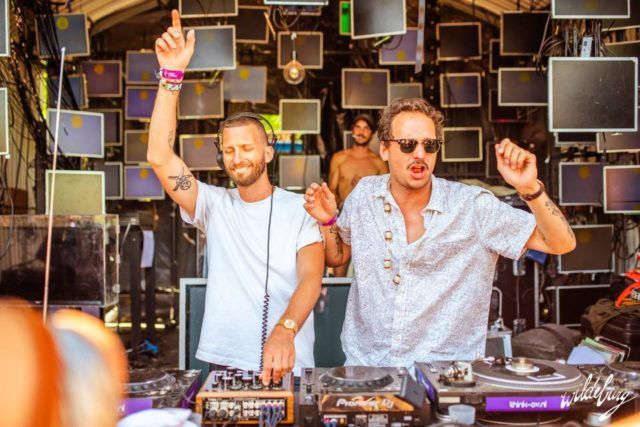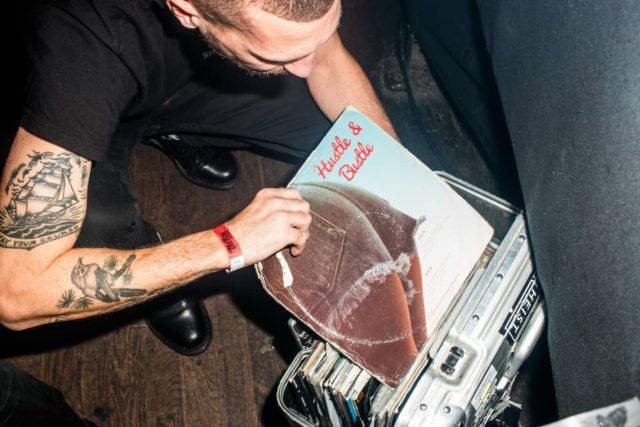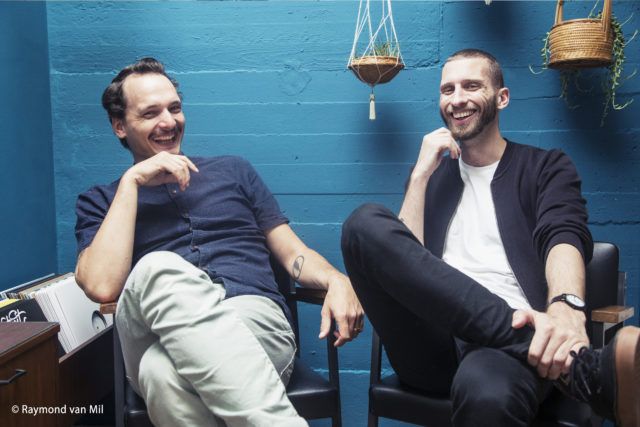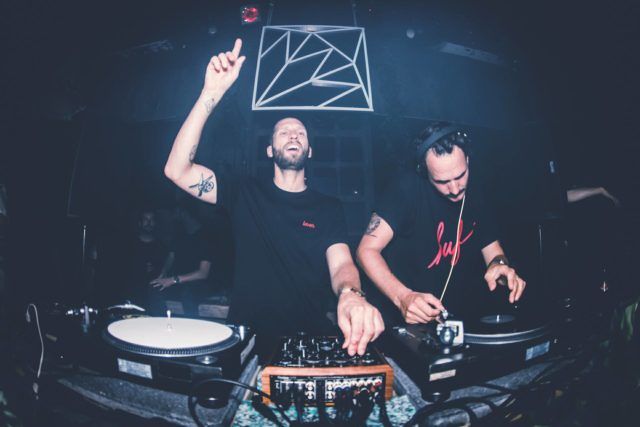The music of Detroit Swindle is largely house, but takes in a wide range of influences. Compare, for example, their recent laid-back, electro-soul remix of Hablot Brown’s ‘GO’ to their burgeoning collection of soul-infused 4/4 underground jams on their Heist catalogue. Their 2018 album ‘High Life’ featured a strong mix of jazz flavoured cuts, melodic beatless pieces and dance floor targeted disco-tech, demonstrating the comfort which with Detroit Swindle move between genres.
As DJs, both Lars and Maarten are avid music collectors, which is reflected in the range of musical influences they bring to bear on their productions and their DJ sets. They’re experienced DJs who are comfortable in the most intimate basement club or on a huge festival stage, happy to adapt their style to the venue and crowd, with the confidence to throw out the occasional musical curveball too.
Who is Detroit Swindle? Lars Dales & Maarten Smeets are a pair of Dutch house producers and DJs who record as Detroit Swindle and DJ together as a duo. They have released on Dirtcrew, Freerange and Tsuba but most of their original material is released via their Heist label who’ve also put out music from artists including Demuir, Nachtbraker, Fouk, Perdu, Adryiano, Matthew Herbert, Ge-Ology, Byron the Aquarius and more. The pair have DJed worldwide.
We chatted to the pair about the reality of DJing as a duo, exactly what equipment they use and much more. If you had any questions about how, why, when and where Detroit Swindle DJ, then the answers are probably below.
Turn this up and read on.
First, thanks for taking the time to chat with us today. Can you start us off with a quick intro for folks who might not know who you are?
Maarten: We are Detroit Swindle, two music heads from Amsterdam with a love for all things funky. We’ve been releasing music for almost 10 years and run our own record label, Heist Recordings.
Tell us a bit about your DJing. What format/kit do you usually use? What style do you play?
Lars: We play everything from house to disco, funk, African music, Latin, jazz, acid, techno. If the energy of two tracks works together, it doesn’t matter what style they are, when they were made or even how bad the recording is. Sometimes, a badly recorded disco song works better than an overproduced song, just because it’s got a unique vibe to it.

You DJ together – tell us about this. Does it always work? What are the pros and cons of DJing in a duo?
Maarten: DJing in a duo takes some time to get used to. We’ve been playing two records each for a long time, but have also done one-by-one for a while. It’s a matter of taste, I guess. Some interesting things can happen when you’re playing together that will never happen for a solo DJ. The surprise of your partner playing something unexpected can call on and build new connections, and suddenly you’re playing something completely different from what you thought you were going to play.
It’s these kinda things that help build the energy between the two of us, and that in turn also reflects on the crowd. Of course, the opposite can happen as well – that you’re just not feeling the selection of the other, and that’s something you have to deal with.
So in terms of equipment, what do you bring with you to gigs?
Lars: We bring quite a lot, as we’re playing vinyl and that’s always a delicate matter in terms of club setup, equipment maintenance, etc. We always bring our own mixer, which is a Condesa Carmen, 4-channel, fully analog rotary mixer. We bring our own needles (Shure Sm-58), a leveler app on our phone, 2 custom vinyl weights for 7” records as well as regular 10”s or 12”s, a cleaning cloth and brush and anti-static spray. Apart from that, we’ve got our records and two SSD discs with all our digital music on them.
You sound like you’re well prepared for any eventuality. What’s the worst technical hitch you’ve ever had DJing? And how did you deal with it?
Lars: Every bad thing that can happen, has happened to us. Unplayable turntables with huge resonance, power outages, glitching CD players, broken headphone connectors in a mixer. You name it, it’s happened to us. And you deal with it by staying calm and focusing on a good comeback once the music is turned on again.

What’s the one piece of advice you’d give to a new DJ?
Lars: Learn to play with actual records and you’ll appreciate the technology even more.
What is it that makes a record work on the dancefloor?
Maarten: Timing. It’s all about delivering a record with the right preparation and build up at the right time.
What do you feel about DJs using FX in their sets? Do you have any little tricks using the FX that you could share with us?
Maarten: FX can help a buildup, but should never take over the song. We’ve travelled with a Roland RE201 Space Echo for a long time. It’s a really nice pedal with reverb and delay, and can give a nice subtle touch to a mix (and can also go crazy like a siren when the feedback is looping for too long). I’m in favour of subtle FX and not on every track, just as I’m in favour of not messing with the Isolators too much.
Regarding EQ and/or filters, then, tell us a bit about the role they play in your DJing style.
Lars: I tend to use it more than Maarten since that’s more in my style of mixing. Our mixer has a 3-band EQ which is quite smooth, so you can accent certain parts of the track without getting too many peaks. The basics are all the same, though: when you’re mixing songs, make sure that you’ve not got too many frequencies interfering – so ideally, you wouldn’t have 2 kicks running at the same time. Kill the low end on one, and then add the low end of the other track.
Apart from that, it’s just a matter of listening to what sounds right while you’re mixing – which might sound like a really obvious comment, but it takes a long time to really master these skills and get a feel for doing the right thing at the right time.

Do you do much live looping or re-editing? Any tips for using loops while DJing?
Lars: We both come from a period where there wasn’t anything like a CDJ, so when they came on the market, we learned to loop manually. Most of the time, we still do that, although the quick loops have gotten better (if you’re playing quantized music) so we use those from time to time as well. Loops can be great tools when you’re mixing tracks and need a few empty bars in one track, for instance.
Do you change your DJing style depending on the size of the room?
Maarten: Yes, we do. We can go subtle for intimate rooms and play banging in big rooms, but sometimes, it’s also about creating surprises and playing music that doesn’t seem fit for the room. Played at the right moment, these tracks kinda can really create magic.
Obviously, a vital aspect of DJing is crate-digging, either in the real world or virtually. How do you source your music?
Lars: Maarten is the vinyl enthusiast, so he goes out digging in stores and browsing Discogs, stuff like that. I do a lot on Youtube and on Bandcamp, I look for exciting new artists. I also just dig through our promos.

Do you use Rekordbox? If so, do you compile playlists?
Maarten: We used to be really diligent with playlists in Rekordbox, categorising everything, but I’ve gotten a bit bored with that. Instead, I just create a playlist of that month, and make a selection for a party and create a separate playlist for that, which then works together with the records I’ve selected for that party.
Can you tell us one of your best DJ moments?
Lars: One of our most memorable moments was a DJ set at a Dutch festival called Wildeburg, which by now is legendary for its 24-hour programming, crazy festival layout, and free-spirited approach to the whole thing.
We played a 6-hour set from 6am to midday as the last stage still open, and we had one of our most intense and beautiful journeys with the crowd. I don’t think we’ve ever had such a connection anywhere else. It was really a moment we’ll never forget.
What’s your favourite place to DJ?
Maarten: That’s impossible to say. We’ve had amazing parties in clubs that are long closed and clubs that are still in the game. from Vent and Kontat in Tokyo to Marktkantine or Shelter in Amsterdam, to Output or Elsewhere in New York, Festivals like Wildeburg or Mareh in Brazil, Concrete in Paris.
It’s all about the connection with the crowd and sharing the love for music. If you feel that with the organiser, the hosts, the visitors, and the staff, you can have a memorable party anywhere in the world.
And finally, what does DJing mean to you?
Maarten: DJing is an expression of emotion that goes beyond words and, in the best possible way, is a narrative formed between two parts of a whole: the selector of the song and the receiver.
Want more Detroit Swindle? You can explore their tunes on Soundcloud, and catch their funky Beatport ReConnect set – streamed in the pouring rain – on YouTube here.





